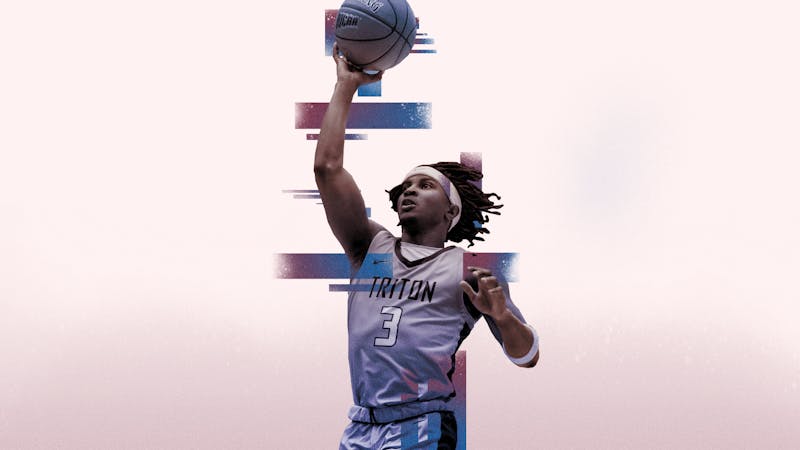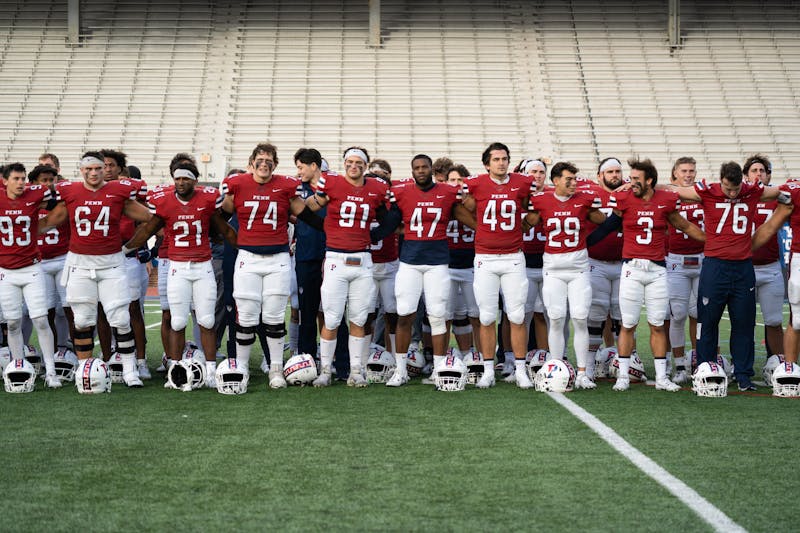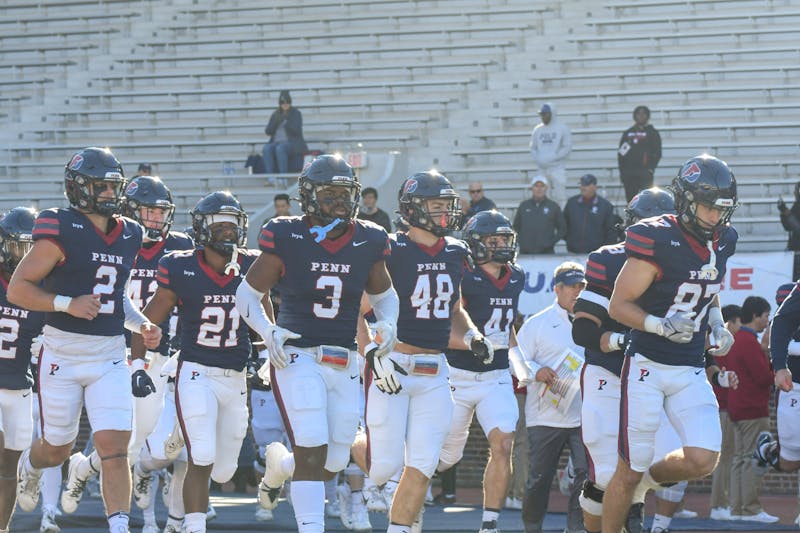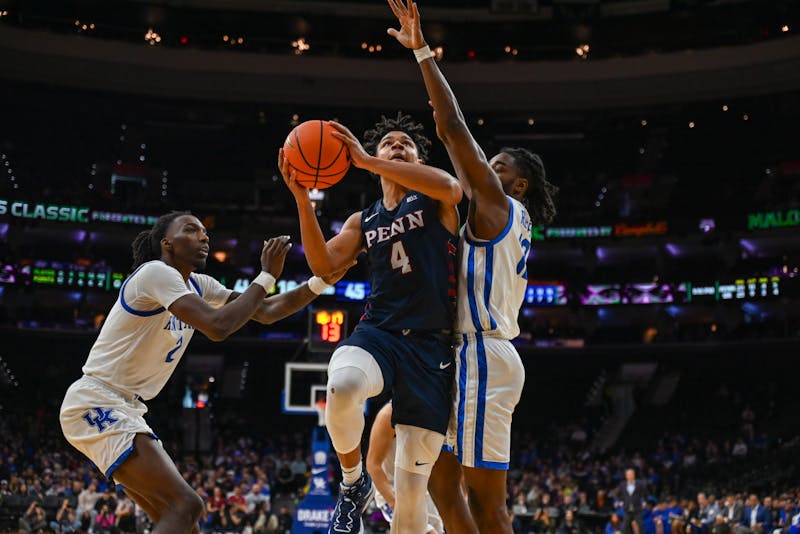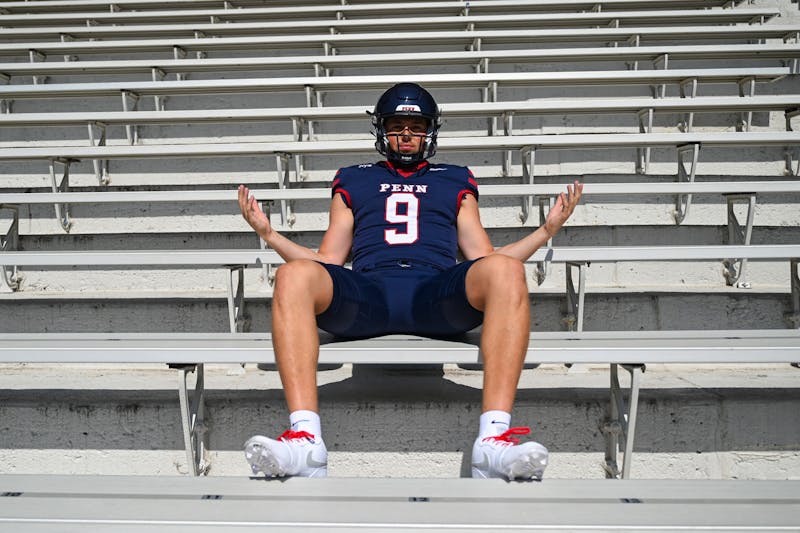
This interview was conducted as part of The Daily Pennsylvanian’s reporting on the state of Ivy League men’s basketball. Check back at thedp.com for additional reporting.
“I was just trying to do what I thought was best at the time, and that’s what these kids are doing now.”
In April 2023, then-junior Penn men’s basketball guard and reigning Ivy League Player of the Year Jordan Dingle announced he would enter the transfer portal for his final year of collegiate eligibility, making him the first in what has since become a wave of star-undergraduate transfers out of the Ancient Eight amid the growing prevalence of Name, Image, and Likeness in college sports.
In an exclusive interview with The Daily Pennsylvanian, Dingle spoke about his departure for the first time, discussing the factors that motivated his decision, his place in the Ivy League’s current inflection point, and how the league can survive in a college sports landscape dominated by big dollars.
Since the United States Supreme Court’s unanimous 2021 ruling that allowed NCAA student-athletes to earn profit from “education-related benefits,” the prevalence of NIL deals in college sports has steadily risen. As of August, the NCAA’s NIL data dashboard indicated that men’s basketball is the highest-valued sport per player, with the average athlete earning roughly $65,000 annually. That number is even larger when segmented to the power conferences, with the average Power 4 men’s basketball player bringing home $171,000.
Dingle, whose 23.4 points per game ranked second in the NCAA in 2023, attested that high-dollar NIL deals were largely absent during his time in the Red and Blue.
“They certainly weren’t anything all that lucrative,” Dingle said of his NIL opportunities at Penn. “Myself and my teammates, we had a couple of small things that we were able to do that maybe got us some free meals or some clothes … but I don’t know that any of us had anything that was significantly valuable from a monetary perspective.”
One of the primary factors behind the Ivy League’s dearth of NIL opportunities is the league’s lack of NIL collectives. At big-time schools across the country, donors pool their money into a fund designed to help facilitate NIL deals for their athletes, resulting in a greater volume of available earnings.
St. John’s, where Dingle played his final year of collegiate basketball, has multiple collectives, including the Johnnies Collective and St. John’s UNLIMITED. Funds like these have allowed wealthy alumni, such as billionaire Mike Repole, to funnel millions of dollars into the pockets of Red Storm athletes.
The school’s institutional commitment to NIL has also been strong and swift: The men’s basketball team at St. John’s will play in a first-of-its-kind $1 million NIL tournament in 2025, while St. John’s Peter J. Tobin College of Business recently unveiled a new NIL course of study. That approach, Dingle said, made a significant difference in his NIL experience — one that saw him land endorsement deals with Bose and Applebee’s, among others.
“There was tremendous efforts across the board,” Dingle said. “[From] the athletic director to even coach [Rick] Pitino taking time out of his own personal life to go do promotional events, showing his face, and taking time out of his busy schedule to make sure that we were able to get any extra thing that we needed. They really did put their best foot forward.”
While NIL was a key aspect of teams’ recruiting pitches once he was in the portal, Dingle attests that his decision to transfer from Penn in the first place was motivated by a desire to further his basketball career. After his dominant junior season, Dingle declared for the NBA draft while maintaining his collegiate eligibility. However, he was not projected in the top-60 league prospects.
Following that evaluation, Dingle embarked on a journey into the portal, where he discovered the level of financial opportunity available elsewhere.
“The NIL potential wasn’t one of the things that made me decide to leave Penn,” Dingle, who now plays for professional Serbian club KK Vojvodina, said. “I realized the potential there was with [NIL at larger schools] once I actually entered the portal, but going into it, that didn’t really factor into my decision. … I was looking for the best situation to help me with my basketball career.”
Dingle’s perspective on the other side of the portal is one shared by other high-profile Penn athletes. Even recent graduate and former Penn women’s basketball guard Kayla Padilla, who sought to maximize her NIL potential, noted that the transfer process for her graduate year allowed her to see “what [she] might have missed out on” at Penn.
While Dingle’s departure may have been motivated by his professional aspirations, it nonetheless opened the door for an exodus of Ivy League stars that many theorize is motivated by NIL. Last spring, the league lost four undergraduate transfers to high-major schools, with Penn’s Tyler Perkins, Harvard’s Malik Mack and Chisom Okpara, and Yale’s Danny Wolf exiting. Perkins and Mack were the first pair of freshmen to transfer out of the Ivy in the same offseason since 2012.
“I want to say good luck to all the athletes that had the courage to follow what they thought was the best move,” Dingle said. “You have a lot of people who will question it, and they’ll say all types of things about walking away from an Ivy League degree. … It’s hard to make that decision."
“For me, I would be lying if I said I didn’t know [my decision] would have some kind of effect down the line,” Dingle continued. “It’s something that was in the back of my mind.”
Many critiques of Dingle and other Ivy defectors have centered around the conference’s long-held trump card: the long-term benefits of an Ivy League degree compared to the short-term appeal offered by larger schools. When Dingle transferred, he was one year away from earning a degree from the Wharton School.
Dingle said he recognizes the merits of a Penn diploma, but that the perks of an Ivy education are not solely reserved for its graduates.
“I don’t have the paper with the University of Pennsylvania’s name on it, but I have relationships that will last a lifetime,” Dingle said of his experience with Penn alumni and classmates. “[An Ivy League degree] is absolutely amazing. But for those who walk away from it, I hope that they’re able to benefit from some of the incredible people that have gone to these Ivy League schools.”
To contend in modern college sports, Dingle said that the Ancient Eight will have to consider its lack of athletic scholarships — an issue he said “shouldn’t even be a discussion anymore.” Dingle added that the practice of abstaining from scholarships, which was recently upheld against a yearslong lawsuit, places a significant financial burden on student-athletes and their families.
Dingle also said that it is easy to understand athletes’ desires to transfer, especially if they “have a lot of money on the table” to play elsewhere.
But as Dingle assesses the state of the conference, he believes there is a path forward. Despite its current state of turbulence, the Ivy League has won games in each of the last two NCAA tournaments, including victories over high-major opponents like Arizona and Auburn. And the driving force behind those victories isn’t going anywhere, Dingle said.
“I think there would be more difficulty getting highly ranked, big-name prospects …” Dingle said of the Ivy’s current model. “But the substance of the Ivy League isn’t having five-star players. … The talent really is with these coaches, like James Jones over at Yale and Mitch [Henderson] over at Princeton, there’s amazing coaches who have great schemes that have stood the test of time.”
“I think that’s really what makes up the competitiveness of the Ivy League, which is why [Yale and Princeton] have had so much success in the postseason,” Dingle said. “So as long as the Ivy League coaches are still there — those passionate and dedicated about basketball — I think the Ivy League will always be a force to reckon with nationally.”
The Daily Pennsylvanian is an independent, student-run newspaper. Please consider making a donation to support the coverage that shapes the University. Your generosity ensures a future of strong journalism at Penn.
Donate







